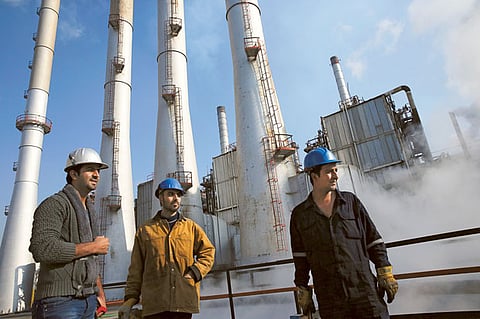End of Iran sanctions to benefit UAE
But move would have negative effects on the global oil market, adding to the already excess supply

Abu Dhabi: The entry of Iran in world oil markets would be negative, while trade between the UAE and Iran would increase if sanctions on the country over its nuclear programme are removed, analysts and experts said.
Iran is holding negotiations with a group of P5+1 countries including Britain, China, France, Russia and the US plus Germany to end decades long blockade on its business. The countries are likely to reach a comprehensive agreement in the next six months.
Iranian president Hassan Rouhani also indicated on Sunday that the country’s isolation from the world economy could soon come to end.
Hussein Asrar Haghighi, vice-executive president of Iranian Business Council in Dubai, said if the talks yield positive results it would give a boost to trade ties between the UAE and Iran.
“We might see a huge trade growth between the two countries. Trade figures would double and business relations would be strengthened. There would be an increase in the number of tourists visiting the UAE,” he said.
“We have to see how sanctions would be eased, whether it would be done in a gradual way or it would be taken up speedily. The outcome would benefit immensely.”
Trade figures between the two countries stood at $8.5 billion (Dh31.19 billion) in 2013. The figure fell to $5 billion in 2014 due to sanctions. Bank accounts of a number of Iranian businessmen were closed.
“Some traders stopped doing business and migrated to other countries due to closure of their accounts. If the talks go in a positive direction, bank accounts of these businessmen might become active again giving a big boost to trade relations.”
Haghighi did not say how many people were affected due to closure of bank accounts. “We don’t know how many but we have seen a significant drop in our membership. Some of them went to Iran while others left to other foreign countries to do business. Banks were under great pressure from the US to close the accounts.”
An energy analyst said if sanctions were lifted the net effect would probably be positive in the UAE, but negative for all other GCC countries.
“The reason why it would be negative is obvious. In a market suffering with an oversupply of oil, an extra million barrels per day would not be welcome. However, Iran’s capacity of adding oil production is limited,” said Francisco Quintana, head of economic research at Asiya Investments.
He said due to international embargo, investment in oil production and maintenance has been extremely low, limiting the possibility of expanding capacity in the short term.
“On the other hand, the UAE would benefit greatly via trade. Dubai has been the traditional gateway for goods to reach Iran. This has also been the case during the embargo, but overall we have noticed that flows Dubai-Iran have been for a long time well below its historical level.”
Recently at an energy conference in Abu Dhabi, Dr Sara Vakhshouri, president of SVB Energy International said an additional oil of 500,000 to 600,000 barrels of oil per day will enter market in the next six to eight months if sanctions on Iran are lifted.
Iran has the second world’s fourth largest proven oil reserves after Saudi Arabia, Venezuela and Canada. It also possesses the second largest natural gas reserves after Russia. Iran produced 3.2 million barrels per day of oil in 2013. The country is facing budget deficit due to drop in oil prices.
Sign up for the Daily Briefing
Get the latest news and updates straight to your inbox



